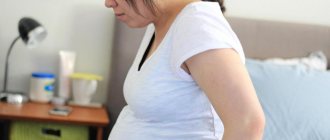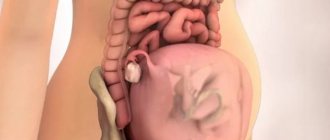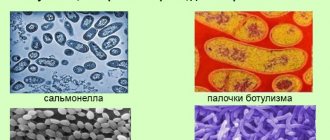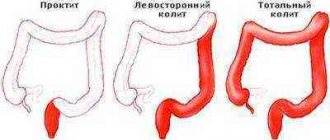Causes of the unpleasant symptom
The occurrence of diarrhea in the first weeks of pregnancy is associated with the production of a hormone that helps slow down the functioning of the intestines for better absorption of substances and vitamins necessary for the normal development of the baby. Loose stools in the 1st trimester several times a day are a normal state of the body. The occurrence of diarrhea in early pregnancy can be caused by other internal and external factors:
- poisoning;
- ingress of pathogenic microbes and bacteria;
- changes in food preferences;
- toxicosis;
- drinking plenty of water;
- pathologies of the stomach and intestines that are chronic;
- unstable blood pressure;
- stressful tension.
Diarrhea during the first trimester of pregnancy can be a consequence of food poisoning. Eating low-quality, stale food causes stomach problems. Throughout pregnancy, many women may be tempted to try new ingredients. The introduction of unusual foods provokes processes in which food is not digested. Expectant mothers begin to eat unlimited amounts of fruits and vegetables containing fiber. Incompatible foods cause diarrhea during pregnancy.
Changes in hormonal levels lead to nausea and vomiting. Toxicosis is the cause of diarrhea in the first trimester. A pregnant woman, like any other person, is susceptible to contracting a viral or intestinal infection as a result of eating poor-quality food or not observing personal hygiene rules.
Hormonal changes entail a decrease in immunity, which affects the exacerbation of chronic diseases of the digestive system. Anxiety is a common condition of a pregnant woman. Against the background of worries and stress, frequent loose stools may occur.
Symptoms during early pregnancy
Vomiting and nausea in pregnant women in the early stages is often a manifestation of toxicosis. The occurrence of early toxicosis is due to the development of the embryo in the uterus, which causes all sorts of complications. This condition is characterized by accompanying symptoms: apathy, loss of appetite, manifestation of taste perversions, intolerance to certain odors, drooling. As a rule, toxicosis lasts up to 12 weeks and does not harm the embryo.
In the first three months of pregnancy, gastrointestinal disorders can have a negative impact on the condition of the developing fetus. Pathogenic microbes easily penetrate the placenta and cause numerous pathologies.
Even more dangerous is increased contraction of the uterine walls during urge. Severe spasms can cause placental abruption and miscarriage.
After 15 weeks, the placenta, which plays a huge role in protecting the fetus, is fully formed and begins to perform its protective functions. During these periods, it is allowed to use some medications, since their effect will not affect the baby’s condition.
Types of diarrhea
Diarrhea in pregnant women can occur several times a day. A single bowel movement is a common occurrence that does not require medical therapy. If diarrhea occurs more than 3-4 times, then you should pay attention to the consistency and color of the stool. The appearance of frequent loose stools indicates the causes of the pathology.
There are 4 types of diarrhea during early pregnancy:
- osmolar;
- secretory;
- hyperesudative;
- hypokinetic, hyperkinetic.
Black and red stool are signs of internal bleeding. Dark masses can be observed after taking vitamin complexes containing large amounts of iron. Red stool combined with pale skin, low blood pressure, vomiting, severe abdominal pain, and dizziness indicate bleeding inside the intestines.
Impurities of scarlet blood in the feces occur due to the formation of hemorrhoids and anal fissures due to impaired venous outflow through the vessels of the rectum during pregnancy.
The dangers of diarrhea in the first trimester of pregnancy
Frequent urge to defecate in the first days and months of pregnancy is dangerous for the mother and the unborn child. Regular diarrhea can lead to serious consequences:
- dehydration;
- intoxication;
- manifestation of dangerous symptoms;
- increasing the tone of the uterus;
- the threat of losing a child;
- disruption of fetal development.
Dehydration is the result of vomiting and diarrhea. The appearance of dry skin of the body, mouth, white coating on the tongue, weakness, problems with urine excretion is a reason to urgently seek help from a doctor. Dehydration leads to disruption of water-salt and electrolyte balance, leaching of beneficial nutrients and vitamins, which negatively affects the well-being of the expectant mother and the development of the fetus.
The penetration of pathogenic microorganisms into the body of a pregnant woman leads to intoxication. Harmful substances enter the bloodstream and therefore affect the development of the embryo. Toxins can lead to miscarriage - the loss of a child.
The occurrence of diarrhea is facilitated by increased motility of the gastrointestinal tract, which is accompanied by pain and spasms. Consecutive contraction of the intestinal muscles causes uterine tone, placental abruption, and as a result, the likelihood of miscarriage.
Can diarrhea be a symptom of pregnancy?
We have already mentioned that after conception, changes occur in all systems of the body and its protective forces are significantly weakened. At the same time, the digestive tract, given its special proximity to the woman’s reproductive organs, reacts most strongly. As a rule, mild (and sometimes serious) toxicosis is the very first to announce the emergence of new life in the womb of a woman. This is followed by stool disorder.
The main reason for the appearance of diarrhea as a sign of pregnancy before a delay is hormonal changes in the body. The main “actors” in the development of pregnancy are progesterone and estrogen. These hormones significantly slow down the functioning of the mother's digestive system so that the necessary substances have time to enter the blood, providing the fetus with adequate nutrition. Such deviations from the usual digestion process cause stool upset.
Take a short online pregnancy test in a couple of minutes and get the answer whether you are pregnant or not.
Loose stools in pregnant women are also an indicator of their psycho-emotional state. Any stressful situation, prolonged anxiety or fear can lead to diarrhea. In this case, such disorders are short-term and, as a rule, do not require treatment.
As you can see, at the beginning of pregnancy, diarrhea can indeed be one of its symptoms. Moreover, if the changes in stool are minor and are not accompanied by pain in the abdominal area, there is nothing to worry about. As soon as the body gets used to the hormonal “innovations”, the diarrhea will go away.
However, keep in mind that diarrhea can be a symptom of gastrointestinal diseases and serious intestinal infections that require immediate treatment. In this case, it does not matter at all whether it is related to conception.
If your stomach hurts, your stools are frequent (more than 3 times a day) and watery, then you shouldn’t think that diarrhea is a sign of pregnancy. You should seek medical help immediately. This is especially true if you are actually pregnant. Self-medication can cause irreparable harm to the baby.
Medical therapy
Treatment of diarrhea in the early stages of pregnancy is necessary after receiving diagnostic results. Therapy directly depends on identifying the cause of the pathology. Treatment of diarrhea involves taking medications, staying hydrated and eating a healthy diet.
Medications
Taking medications to solve stool problems should only be done as recommended by a doctor. Many medications are contraindicated for pregnant women, for example, taking antibiotics. There is a list of medications that eliminate the causes of loose stools without harming the health of the expectant mother and fetus:
- rehydration solutions;
- adsorbents;
- products containing enzymes.
To avoid dehydration, pregnant women need to take solutions containing salt and glucose. Such drugs help maintain water-salt balance when nutrients are washed out during diarrhea.
Adsorbents are the main category of medications that are safe for the development of the embryo. Such drugs help eliminate toxins and reduce the risk of intoxication of the body. Adsorbent agents, for example, Smecta powder, Enterosgel suspension, Lactofiltrum capsules, activated carbon, should not be taken simultaneously with vitamin complexes.
If the cause of frequent bowel movements is a chronic type of disease of the stomach or intestines, then the pregnant woman needs to take enzyme medications, for example, Mezim, Creon tablets.
Drinking regime
Therapeutic therapy involves maintaining a drinking regime. If diarrhea occurs, a pregnant woman should drink 3.5 liters of liquid: pure water, saline solutions, herbal infusions. The use of drinks prepared according to the advice of traditional medicine should be carried out under the supervision of a doctor in order to avoid causing irreparable harm to the health and unborn baby. You can cure diarrhea using proven recipes:
- rice water;
- a solution of water with potato starch;
- decoction of blackberry leaves;
- blueberry jelly;
- herbal tea with the addition of chamomile, lemon balm, mint, oak bark, St. John's wort, calamus, wormwood;
- motherwort decoction;
- pomegranate peel tea.
The use of herbal and medicinal preparations should be carried out in the absence of indications for use: allergies, intolerance to components. It is not recommended to use traditional methods yourself.
Healthy diet
When a woman becomes pregnant, she should pay special attention to her diet. When loose stools appear, you must follow the rules of a therapeutic diet:
- exclude from the menu spicy, fatty, salty, smoked dishes, semi-finished products, unheated foods, sausages, dairy products, strong drinks;
- consumption of lean meats, poultry, light soups, porridges cooked with water, dried bread, steamed or baked vegetables;
- fractional meals;
- eating moderate amounts of food;
- avoidance of exotic ingredients;
- inclusion of high-quality, fresh foods in the diet.
The diet should be balanced and varied for normal mental and physical development of the fetus.
Prevention
To avoid intestinal upset and relapse of the disease, it is necessary to eat fresh food, control the amount of food consumed, do not go hungry, and do not overeat. It is important for a pregnant woman to observe the rules of personal hygiene: wash her hands more often before eating.
In the early stages, it is not recommended to visit large crowds of people, so as not to become infected with viral and colds. Taking special vitamin and mineral complexes and frequent walks in the fresh air will strengthen the expectant mother’s immunity.
Pregnancy is an important stage in a woman’s life. During this period, you need to closely monitor your health to avoid pathologies of embryo development. Diarrhea in the first trimester may indicate the occurrence of serious internal diseases. Timely treatment, including taking medications and following a diet, will help avoid the development of complications.
The information" on our website is provided by qualified doctors and is for informational purposes only. Don't self-medicate! Be sure to consult a specialist!
Author: Rumyantsev V. G. Experience 34 years.
Gastroenterologist, professor, doctor of medical sciences. Prescribes diagnostics and carries out treatment. Expert of the group for the study of inflammatory diseases. Author of more than 300 scientific papers.
Women often come to the doctor with symptoms such as diarrhea during early pregnancy. The causes of diarrhea during pregnancy can be different - from digestive problems to infections, which requires treatment.
Sometimes diarrhea occurs in early gestation as a response to conception. In other cases, a similar symptom is a consequence of toxicosis.
Treatment
Medicines are prescribed only for pronounced symptoms. If indigestion does not cause severe concern, then following a diet and drinking regime is sufficient.
Therapeutic nutrition must be balanced. Eating frequently, but in small portions. Proteins should predominate in the diet, and the intake of fats and carbohydrates should be reduced. Fried and fatty foods, smoked and salty foods, marinades and spices, and other products that have a choleretic effect and irritate the intestinal tract are removed from the menu.
The menu should include:
- fresh oatmeal or rice porridge with water;
- vegetable, cereal, pasta soups without fat;
- steamed cutlets and meatballs from lean meat or fish;
- fermented milk products (yogurts rich in bifidobacteria are especially recommended);
- boiled or steamed vegetable dishes;
- fruits and berries (apples, bananas, pears, blueberries are healthy).
During treatment, you need to drink enough liquid, but not in excess, otherwise swelling and increased blood pressure may occur. The optimal amount to drink is 100 ml per hour. It is recommended to drink water, berry jelly and fruit drinks, tea (black or herbal), fresh squeezed juices, and milk drinks. Chamomile, mint, sage, lemon balm, and St. John's wort are suitable for making herbal tea.
To improve well-being, stimulate metabolism and normalize the emotional state disturbed by the pathological process, daily long walks in the fresh air are useful.
Possible reasons
When pregnancy begins, a woman’s body undergoes powerful hormonal changes. This causes symptoms of toxicosis, including nausea, vomiting, and diarrhea. The latter is manifested by slight loosening of the stool no more than 3 times a day.
Why is this happening? After conception and implantation of the embryo, the hormone progesterone begins to be synthesized in large quantities in the uterus. One of its effects is to slow down the movement of digestive residues through the intestines to improve the absorption of nutrients, because now the mother’s body requires twice as many resources. The consequence of these processes is often constipation, but diarrhea can also develop, much depends on the individual characteristics of the body.
Attention: Mild diarrhea in the 1st trimester caused by toxicosis is not dangerous and, as a rule, stops on its own. This is more like a thinning of the stool consistency and an increase in the frequency of urges up to 3 times a day.
Diarrhea in pregnant women in the first trimester can develop for the same reasons as in other people:
- Intestinal infection. The most dangerous cause for the woman and fetus requires immediate medical attention and treatment. Bacterial diarrhea is caused by salmonella, Staphylococcus aureus, and E. coli. The causative agents of viral diarrhea are rotavirus and enterovirus. Symptoms are complemented by pain in the intestines and an increase in overall body temperature.
- Poisoning from low-quality or expired products , poorly washed vegetables and fruits. Pregnant women should be more careful about the food they eat.
- Worm infestation. Infection with parasites leads to similar symptoms – diarrhea, abdominal pain. It is important to monitor the health of your pets and carefully observe hygiene rules.
- Changing your usual diet. Pregnancy often affects a woman's taste preferences. Some people start eating salty foods, others – sweet ones. This leads to intestinal upset.
- Chronic diseases of the digestive system. Errors in diet during pregnancy provoke exacerbation of existing diseases. The problem can be solved by following a diet and establishing a diet.
- Consuming foods high in fiber. To provide the future baby with all the necessary nutrients, the expectant mother often includes more fruits and vegetables in her daily diet than usual. Changing the diet causes loose stools and abdominal discomfort.
- Labile blood pressure. In the early stages, a pregnant woman's blood pressure may rise or fall sharply. This is a short-term condition, but loose stools may occur at this point.
Menu
- warm drink from 2 l. per day;
- exclusion of pickled, fatty, salty, smoked foods;
- crushed meals - 5 times a day, in small portions;
- strong tea with crackers – 4 times a day;
- prebiotics – Acipol, Linex, Bifiform (available without a prescription);
- porridge with water - rice, buckwheat, wheat (can be corn + rice);
- vegetables – boiled carrots, corn, potatoes, cucumbers, broccoli (not>300 g per day);
- meat – lean beef, chicken, turkey (cook without skin);
- lean fish - cod, pike perch;
- jelly, compotes of blackcurrant, rosehip, blueberry.
The diet is followed for 7–10 days. Pork, sausage, sausages are allowed only 14 days after the end of diarrhea, 50–100 g per day. Black tea, jelly, and rosehip decoctions are good for fixing stools. It is recommended to take throughout the entire gestation period.
Is diarrhea dangerous during pregnancy?
The consequences of diarrhea in the early stages of gestation depend on the cause that caused it and the severity.
If diarrhea occurs after indigestion, it goes away on its own and no therapy other than normal nutrition is needed. For an infectious cause, treatment prescribed by a doctor is required.
Why is diarrhea dangerous for a pregnant woman?
- Spasms in the intestines can provoke uterine hypertonicity. This is fraught with spontaneous abortion.
- The infection causes an increase in temperature, which adversely affects the embryo.
- The penetration of viruses and toxins into the fetus through the bloodstream can cause deviations in its development.
- Dehydration of the body. Diarrhea removes fluid from the body, which disrupts the water-salt balance.
In some cases, pregnant women complain of black stool. The reason is often due to taking iron supplements, which are prescribed for anemia. If a woman is not taking such medications, black stools may indicate intestinal bleeding. In this case, immediate medical attention is required.
Video about manifestations of toxicosis
Causes of loose stools
Often this condition consists of morning sickness and periodic vomiting. But often these phenomena are also accompanied by diarrhea.
Important! If loose stools occur no more than 5 times a day, occur without severe pain, there is no blood or mucus in the stool, and the body temperature is normal, then there is no threat to the fetus and mother.
With toxicosis, diarrhea has the following causes:
- Hormonal imbalances (surges, declines).
- Due to poisoning by toxins and other harmful substances formed in a pregnant woman during the development of the fetus.
- The emergence and reproduction of infections and viruses.
- Excessive intake of iron in the form of vitamin complexes.
- Lactose intolerance.
Can diarrhea occur with toxicosis? Many women note that in the early stages, a similar unpleasant phenomenon occurs after taking vitamin E or the drug Elevit.
If loose stools appear in the last trimester, this may indicate an imminent birth.
Experts note that with intestinal infections and allergic reactions, diarrhea disappears immediately after the cause of the disorder is eliminated.
Toxicosis in the form of diarrhea during pregnancy is not considered a dangerous condition by doctors and is not an indication for a woman’s hospitalization.
However, in the process of frequent bowel movements, the salt and protein balance and the level of fats and carbohydrates are disturbed. Therefore, in such a state, it is recommended to drink 100-150 ml of clean, boiled water, tea or herbal infusion every hour to compensate for lost fluid and prevent dehydration.
What to do?
Taking any medications during gestation should be kept to a minimum to avoid harmful effects on the fetus. Therefore, if diarrhea occurs during pregnancy, it is recommended to first remove foods with a laxative effect from the diet. You should not take medications without consulting a doctor.
What can you eat
If you have signs of diarrhea, you should exclude from the menu:
- fresh vegetables and fruits;
- fatty dishes and broths;
- spicy, sweet, salty;
- sausages;
- milk;
- fermented milk products.
Useful for diarrhea during pregnancy to improve well-being:
- strong sweet black tea;
- jelly;
- dried bread, crackers, dried rye bread;
- pasta;
- porridge cooked in water;
- low-fat steam cutlets;
- lean steamed fish.
Drugs
First aid for diarrhea, especially in case of poisoning, drugs from the adsorbent group. They remove all toxins from the body, relieving the symptoms of intoxication.
These include:
- Activated carbon.
- Estimate.
- Lactofiltrum.
- Enterosgel.
Adsorbents are not absorbed into the bloodstream and therefore do not affect the embryo in any way. It is important to follow the recommended dosage, otherwise constipation may occur.
For diarrhea caused by dietary errors or chronic diseases of the gastrointestinal tract, taking enzymes - Pancreatin, Mezim - is effective.
It is important to restore the water-salt balance during diarrhea, which occurs due to fluid loss from the body. The drugs Regidron or Trisol are suitable for this.
We recommend reading the article about why the lower abdomen feels tight in the early stages of pregnancy. From it you will learn about physiological causes, symptoms of pathology, non-gynecological causes, and the need for treatment.
What kind of discharge can occur in the early stages of pregnancy? Read here.
How to warn?
After conception, a woman should adhere not only to a healthy lifestyle, but also to the principles of proper nutrition. A balanced diet makes it possible to provide the fetus with essential nutrients, minerals and vitamins.
Dietary recommendations:
- Frequent meals in small portions.
- The calorie content of meals should be 10–15% more than before pregnancy.
- Try not to overeat. This will lead to excess weight and intestinal disorders.
- Include only fresh foods in your diet.
- Meat and fish dishes should only be eaten after careful heat treatment.
- Refuse unfamiliar, exotic dishes.
- Maintain good hygiene and wash your hands well after leaving public places.
Diarrhea during pregnancy can be treated, but it is better to prevent this condition. This will allow you to save the child and eliminate adverse effects on its development.
Intestinal infection
Vomiting and diarrhea during pregnancy are dangerous due to dehydration
The presence of diarrhea due to an intestinal infection practically does not pose a threat to the child, since the causative agent of the disease affects the woman’s intestines. The most negative symptom is dehydration and the inability to take popular medications.
In such cases, intestinal infections should be treated with “gentle” antibiotics that do not have a negative impact on the baby’s development. The main symptoms of an intestinal infection are nausea, diarrhea and vomiting.
Fever and loss of appetite are also common. It is important not to delay treatment in such cases. Promptness will help avoid problems with dehydration, which can cause hypoxia in a child.
What is diarrhea and its types
If in a healthy person diarrhea, regardless of its causes, is a pathology, then in a pregnant woman it may be part of a physiological process associated with her position. But diarrhea can also be a sign of certain diseases and disorders of the body. Therefore, it is very important to differentiate the manifestation of diarrhea as normal and as pathology.
Diarrhea is when a person has bowel movements more than 3 times a day. The feces are liquid, often with a foul odor and foreign impurities (blood, mucus). The color of stool may vary depending on the cause of the diarrhea.
There are several types of diarrhea:
- Secretory - appears due to a violation of the secretion of sodium and water, and a decrease in the absorption of the intestinal walls. The stool is very watery and usually green in color.
- Hyperexudative – appears in various gastrointestinal pathologies (Crohn’s disease, salmonellosis, intestinal carcinoma, ulcer). Foreign impurities may be found in the stool.
- Osmolar is a pathological process that manifests itself due to impaired absorption of certain elements: dysbacteriosis, enzyme deficiency, morphological transformation of the gastrointestinal mucosa. The stool is characterized by the presence of a large amount of undigested food.
- Hyper- and hypokinetic – a consequence of gastrointestinal motility disorders after exceeding the dose of laxatives. This form of diarrhea can occur as a result of anxiety and irritable bowel syndrome. Characterized by copious excretion of feces in the form of liquid gruel.
Possible causes of diarrhea and vomiting in pregnant women
The causes of diarrhea and vomiting during pregnancy can be various factors. During the development of the fetus, the mother's digestive tract is rebuilt, changing the activity of work, which is why digestive disorders become more frequent - this can be considered as a variant of the norm.
However, with food poisoning, pathologies of the stomach and intestines, malfunctions of the digestive system, the condition can worsen to such an extent that the woman does not leave the bed, suffers from spasmodic pain in the abdomen and an increase in body temperature.
The provocateurs of the pathological condition are most often:
- Food poisoning . A woman can be poisoned by a stale or low-quality product, picked mushrooms or berries, or taken medicinal plants without consulting a doctor. The pathological process is accompanied by nausea, frequent vomiting, pain in the umbilical area, diarrhea, excessive gas formation, bloating, and increased body temperature.
- Diseases of the digestive organs . They can take a chronic form - then the woman suffers from diarrhea and minor vomiting for days and weeks. Stomach and intestinal pathologies are usually accompanied by loss of appetite, bitter taste in the mouth, pain in the epigastric zone, excessive gas formation, and bloating. With such symptoms, colitis, gastritis, pancreatitis should be suspected.
- Infectious intestinal pathologies . May be dangerous to the developing fetus. To reduce the likelihood of negative effects, measures are taken to reduce fluid content in the mother's body. When an infection enters the body, a decrease in appetite, lethargy and impotence, and an increase in body temperature are noted. Treatment of infectious diseases in pregnant women is difficult, since antibiotics are prohibited. It is necessary to use gentle and less effective therapeutic methods.
- Poor nutrition . Pregnant women often want to eat something unusual and exotic. The digestive tract, which is undergoing restructuring, reacts to changes in food preferences with nausea and diarrhea. Also, digestive disorders can be a consequence of excessive consumption of one product or an unbalanced diet.
- Side effects from taking medications . The sensitive digestive tract of a pregnant woman perceives some drug components as toxic substances. A natural reaction to poisons is vomiting and bowel dysfunction.
- Irritable bowel syndrome is a common pathology in expectant mothers, provoked by the pressure of the rapidly expanding uterus on the intestinal tract.
In different trimesters of gestation, vomiting and diarrhea are caused by various factors and manifest themselves differently:
- In the first trimester , the disorder occurs often, its symptoms are most pronounced, which is due to hormonal changes in the body and restructuring of the digestive tract. Diarrhea and vomiting in early pregnancy seriously threaten the fetus. With diarrhea, the mother's body is deprived of a significant amount of vitamins, minerals and bioactive compounds necessary for the full development of the embryo. Severe diarrhea can provoke uterine contractions and increase the risk of miscarriage. More is written about the treatment and prevention of diarrhea in the first trimester of pregnancy here.
- In the second trimester, indigestion is caused by various factors. If the cause of the pathology is an infectious lesion of the body, then the doctor may prescribe antibiotics until the placenta is formed. As long as there is no placental transfer of substances, drug components do not affect the fetus.
- In the third trimester , diarrhea without nausea may signal impending labor.
Abnormal bowel movements are caused by hormonal changes and are required to cleanse the body before the birth process. Prenatal diarrhea can begin at 28 weeks of gestation. But late-term indigestion is not always a signal that labor is approaching. If the expectant mother has a fever and starts vomiting, then poisoning or an infection should be suspected. In the last weeks of pregnancy, pathological processes have virtually no effect on the already fully formed fetus. Read more about the causes, consequences and treatment of diarrhea in the third trimester of pregnancy here.
Causes of diarrhea during pregnancy
Factors that cause diarrhea early in pregnancy may include:
- Dietary disorder. During pregnancy, women often change their taste preferences and begin to eat foods that they did not eat before conception. When combining incompatible products, stool may be disrupted.
- Toxicosis, changes in hormonal levels due to pregnancy. Restructuring the body can cause intestinal dysfunction and provoke diarrhea.
- Excessive emotional stress and anxiety that pregnant women face can affect the functioning of the gastrointestinal tract.
- Food poisoning , which occurs when eating spoiled foods. In addition to diarrhea, the patient experiences vomiting and nausea. Intoxication of the body occurs.
- Intestinal infections (cholera, dysentery, rotavirus, etc.) are dangerous pathologies that cause diarrhea. They can greatly affect the course of pregnancy, so the first signs of the disease should be a reason to immediately consult a doctor.
- Worms can appear due to poor hygiene, improper food preparation, and consumption of unwashed fruits.
- gastrointestinal diseases often provoke frequent loose stools.
- When using laxatives in abnormal doses, diarrhea may occur. After stopping taking such medications, it goes away.
Is diarrhea a reliable sign of pregnancy?
Based on the above, it is obvious that stool disorder can be a symptom of pregnancy. However, it should not be considered as a reliable sign. After all, the presence of conception is determined by a set of general symptoms:
- Nausea in the morning;
- Soreness and hardening of the mammary glands;
- General weakness and fatigue;
- Delayed menstrual cycle.
In any case, diarrhea and other first signs of pregnancy need to be confirmed using special home tests. And the most reliable way to determine conception is a blood test, which will accurately determine the hormone levels - you need to donate blood for hCG.
Let us remember that the causes of diarrhea in pregnant women are not always associated with harmless changes in the woman’s hormonal levels. Therefore, leaving the matter to chance or, even worse, trying to treat it yourself is extremely undesirable. Infectious or intestinal disorders can cause serious problems.
First aid for diarrhea
If there are no other symptoms other than diarrhea, you can take the first steps at home . First you need to skip a few meals. In this case, you need to increase your fluid intake . Portions should be frequent and fractional, so as not to cause vomiting by drinking too much. The best remedies for the body’s loss of minerals and fluids are still water, tea, a decoction of chamomile or St. John’s wort, as well as Regidron.
Next, you should seek help from a specialist . He will order additional tests to help determine what caused the diarrhea and determine a treatment regimen.
Diarrhea due to toxicosis, when should you not worry?
During pregnancy, there is a so-called triad of symptoms, including vomiting, indigestion, and nausea. Sometimes, if a woman does not yet know about her “interesting situation,” these symptoms can give her an idea.
Does diarrhea occur with toxicosis and how can it be distinguished from a threatening pathology? In a non-hazardous condition, these three signs should be characterized by:
- Long periods of time;
- Impermanence;
- Body temperature is normal;
- There are no additional inclusions in the stool.
If in this case the general condition does not worsen, intestinal dysfunction does not cause severe pain or discomfort, there is no reason to worry.
However, every woman should know what symptomatic treatment to take to reduce susceptibility and improve the condition. This will ensure high-quality and effective care for your baby!
Source
Diarrhea and vomiting are common during pregnancy. The reason for this malaise is the increased sensitivity of the female body to various environmental factors. Typically, such symptoms go away on their own within a few hours, but if they last for several days and become pronounced, you should immediately consult a doctor and begin treatment.
How to treat diarrhea during pregnancy
Therapy aimed at eliminating diarrhea can be inpatient or home .
Hospitalization in a hospital is mandatory if diarrhea is accompanied by stomach pain, weakness and malaise. In case of severe intoxication, infusion therapy is prescribed. If diarrhea is caused by severe food poisoning, gastric lavage is performed, after which the patient needs absolute rest.
Drug therapy
For uncomplicated diarrhea during pregnancy, diarrhea can be treated at home with drugs that do not harm the pregnant woman and the fetus. What can you do for diarrhea during pregnancy?
- Activated carbon is the most budget-friendly product that should be taken at the rate of 1 tablet per 10 kg of body weight. It removes toxins and normalizes stool.
- Smecta is a powder that needs to be dissolved in 100 g of warm water and drunk in one go.
- Regidron is a remedy that prevents dehydration of the body. Dissolve 1 sachet in 1 liter of water and take in small portions every 5-10 minutes.
- Enterosgel – frees the intestines from harmful elements, removes toxins.
To normalize the functioning of the gastrointestinal tract, the doctor may prescribe enzyme agents: Pancreatin, Creon, Mezim.
Diarrhea in early pregnancy
One of the most common periods of pregnancy during which physiological diarrhea occurs is the early stages (first trimester). The culprits may be the woman’s own hormones, which support pregnancy and the growth of the fertilized egg, as well as foreign components of the fetus during its intensive growth and development. In this way, like diarrhea, the body tries to throw out substances that are unusual for a pregnant woman. The natural route for their elimination is usually the gastrointestinal tract, which begins to work in enhanced mode.
A feature of diarrhea in early pregnancy is its high frequency with a high risk of dehydration due to concomitant vomiting. Against the background of toxicosis, appetite sharply decreases, any desire to eat or drink anything disappears, so as not to provoke the resumption of unpleasant symptoms. This is a typical scenario for complications of early toxicosis, accompanied by diarrhea. Therefore, if diarrhea persists, it is important to consult a specialist in a timely manner.
How to cope with toxicosis during pregnancy at home?










